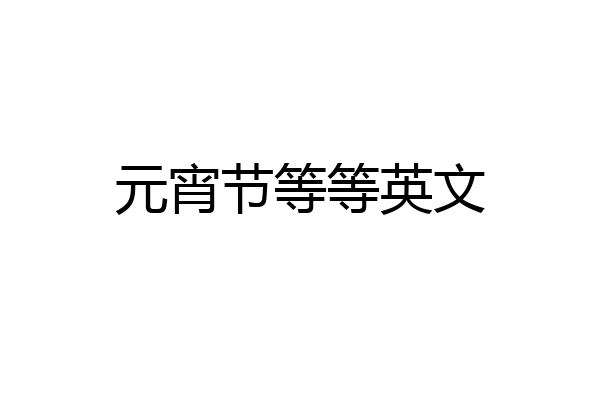
黑玫瑰1111
下面是关于中国传统节日--中秋节的全英文介绍,包括您要的风俗,来源等。The Mid-autumn festival is one of the two most important occasions in Chinese calendar (the other being the Spring Festival or the Chinese New Year) and it is an official holiday. It is a time for families to be together, so people far from home will gaze longingly at the moon and think about their families.Chinese Mid-Autumn Festival, also known as Chinese Moon Festival, takes place at the 15th day of the eighth Chinese lunar month. The reason for celebrating the festival during that time is that it is the time when the moon is at its fullest and brightest.The traditional food for mid-autumn festival is the moon cake which is round and symbolizes reunion.Celebration of Mid-autumn festival has a long history. In ancient times, the emperors had the tradition of worshiping the Sun in spring, and the Moon in autumn. Almost every traditional Chinese festival has a connection with legends. The most well-known stories of the Mid-Autumn Festival is Chang'e flying to the moon, Jade Rabbit making heavenly medicine, and Wu Gang chopping the cherry bay. Those stories have been passed down from generations to generations alongside the celebrations of the festival itself.


麦麦咔咔
农历正月初一春节 Spring Festival (Chinese New Year)农历正月十五元宵节(灯节) Lantern Festival农历二月初二青龙节/中和节 Zhonghe Festival (Zhong He Jie) 农历三月初三上巳节/女儿节 Shangsi Festival (Shang Si Jie) 农历四月五日前后清明节 Qing Ming Jie (Tomb Sweeping Day, Mourning Day, Ching Ming Festival) 农历五月初五端午节 Dragon Boat Festival (Dragon Festival, Tuen Ng Festival)农历六月初六洗晒节 Bathing and Basking Festival (Xi Shai Jie) 农历七月初七乞巧节(七夕) Double-Seventh Day / The Night of Sevens (Magpie Festival, Qi Xi) 农历七月十五中元节 Spirit Festival (Ghost Festival) 农历八月十五中秋节 Mid-Autumn Festival (Moon Festival)农历九月初九重阳节 Double Ninth Festival (Dual-Yang Festival, Chung Yeung Festival) 农历十月十五下元节 Spirit Festival/ Water Lantern Festival农历十一月初七冬至 Winter Solstice Festival (Mid-Winter Festival) 农历腊月初八腊八节 Laba Festival (Congee Festival)农历的最后一天除夕 Chinese New Year Eve

shangna52088
1、除夕:New Year's Eve
除夕,为岁末的最后一天夜晚。岁末的最后一天称为“岁除”,意为旧岁至此而除,另换新岁。除,即去除之意;夕,指夜晚。“除夕”是岁除之夜的意思,又称大年夜、除夕夜、除夜等,时值年尾的最后一个晚上。
2、春节:the Spring Festival
春节,即农历新年,是一年之岁首,亦为传统意义上的“年节”。俗称新春、新岁、新年、新禧、年禧、大年等,口头上又称度岁、庆岁、过年、过大年。春节历史悠久,由上古时代岁首祈年祭祀演变而来。
3、元宵节:the Lantern Festival
元宵节,又称上元节、小正月、元夕或灯节,为每年农历正月十五日,是中国的传统节日之一。正月是农历的元月,古人称“夜”为“宵”,正月十五日是一年中第一个月圆之夜,所以称正月十五为“元宵节”。
4、春龙节(龙抬头):Dragon-head-raising-Festival
龙抬头(农历二月二),又称春耕节、农事节、青龙节、春龙节等,是中国民间传统节日。“龙”是指二十八宿中的东方苍龙七宿星象,每到仲春卯月之初,“龙角星”就从东方地平线上升起,故称“龙抬头”。
5、寒食节:Cold Food Festival
寒食节:在夏历冬至后105日,清明节前一二日。是日初为节时,禁烟火,只吃冷食。并在后世的发展中逐渐增加了祭扫、踏青、秋千、蹴鞠、牵勾、斗鸡等风俗,寒食节前后绵延两千余年,曾被称为中国民间第一大祭日。
6、清明节:Tomb Sweeping Day
清明节,又称踏青节、行清节、三月节、祭祖节等,节期在仲春与暮春之交。清明节源自上古时代的祖先信仰与春祭礼俗,兼具自然与人文两大内涵,既是自然节气点,也是传统节日。
7、端午节:the Dragon Boat Festival
端午节(农历五月初五),又称端阳节、龙节、重午节、龙舟节、正阳节、浴兰节、天中节等等,是中国民间的传统节日。端午节源自天象崇拜,由上古时代龙图腾祭祀演变而来。
8、七夕节:Magpie Festival
七夕节,又称七巧节、七姐节、女儿节、乞巧节、七娘会、巧夕、牛公牛婆日、双七等,是中国民间的传统节日,为传统意义上的七姐诞。因拜祭“七姐”活动在七月七晩上举行,故名“七夕”。
9、中元节:Hungry Ghost Festival
中元节,即七月半祭祖节,又称施孤、鬼节、斋孤、地官节,节日习俗主要有祭祖、放河灯、祀亡魂、焚纸锭等。中元节由上古时代“七月半”农作丰收秋尝祭祖演变而来。
10、重阳节:Double Ninth Festival
重阳节,为每年的农历九月初九日,是中国民间的传统节日。《易经》中把“九”定为阳数,“九九”两阳数相重,故曰“重阳”;因日与月皆逢九,故又称为“重九”。
11、中秋节:Mid-autumn Festival
中秋节,又称月夕、秋节、仲秋节、八月节、八月会、追月节、玩月节、拜月节、女儿节或团圆节,是流行于中国众多民族与汉字文化圈诸国的传统文化节日,时在农历八月十五;因其恰值三秋之半,故名,也有些地方将中秋节定在八月十六。

2013rabbit
1,元旦(1月1日,放假一天):New Year2,春节(农历新年,除夕、正月初一、初二放假三天):Spring Festival3,清明节(农历清明当日,放假一天):Tomb-sweeping Day4,国际劳动妇女节(3月8日,妇女放假半天):International Working Women's Day5,植树节(3月12日):Arbor Day6,国际劳动节(5月1日,放假一天):International Labor Day7,中国青年节(5月4日,14周岁以上的青年放假半天):China Youth Day8,端午节(农历端午当日,放假一天):The Dragon Boat Festival9,国际护士节(5月12日):International nurse's Day10,儿童节(6月1日,不满14周岁的少年儿童放假一天):Children's Day11,教师节(9月10日):Teachers' Day12,中秋节(农历中秋当日,放假一天):Mid-Autumn Festival13,国庆节(10月1日,放假三天):National Day14,记者节(11月8日):Journalist's Day扩展资料春节是除旧布新的日子,春节虽定在农历正月初一,但春节的活动却并不止于正月初一这一天。从腊月二十三(或二十四日)小年起,人们便开始忙年:祭灶、扫尘、购置年货、贴年红、洗头沐浴、张灯结彩等等,所有这些活动,有一个共同的主题,即辞旧迎新。春节是个欢乐祥和的节日,是合家团圆的日子,也是人们抒发对幸福和自由向往的狂欢节和永远的精神支柱。过春节前,别井离乡的人们都尽可能地回到家里和亲人团聚,共享天伦之乐。除夕,全家欢聚一堂,吃罢团年饭,长辈给孩子们分发压岁钱,一家人团坐守岁。年节期间,亲朋好友之间相互走访拜年,表达对亲朋间的情怀以及对新一年生活的美好。

angelabaobao
中国节日英文对照表:
1、元旦(1月1日)NewYear'sDay
2、春节(农历一月一日)theSpringFestival
3、元宵节(农历一月十五日)theLanternFestival
4、国际劳动妇女节(3月8日)International Working Women's Day
5、植树节(3月12日)ArborDay
6、邮政节(3月20日)PostalDay
7、世界气象节(3月23日)WorldMeteorologyDay
8、清明节(4月5日)ChingMingFestival;Tomb-sweepingFestival
9、国际劳动节(5月1日)InternationalLabourDay
10、中国青年节(5月4日)ChineseYouthDay
11、护士节(5月12日)Nurses'Festival
12、端午节(农历五月初五)theDragonBoatFestival
13、国际儿童节(6月1日)InternationalChildren'sDay
14、中国共产党成立纪念日(7月1日)theParty'sBirthday
15、建军节(8月1日)theArmy'sDay
16、中秋节(农历八月十五)Mid-autumn(Moon)Festival
17、教师节(9月10日)Teachers'Day
18、重阳节(农历九月九日)Double-ninthDay
19、国庆节(10月1日)NationalDay
20、除夕(农历十二月三十日)NewYear'sEve
中国假期的英文定义
1、元旦
New Year is the time at which a new calendar year begins and the calendar's count increments by one. Many cultures celebrate the event in some manner.
2、春节
Chinese New Year, known in modern Chinese as the "Spring Festival", is an important Chinese festival celebrated at the turn of the traditional lunisolar Chinese calendar. Celebrations traditionally run from the evening preceding the first day, to the Lantern Festival on the 15th day of the first calendar month.
3、清明节
The Qingming, also known as Tomb-Sweeping Day in English, is a traditional Chinese festival. Qingming Festival is when Chinese people visit the columbaria, graves or burial grounds to pray to their ancestors.
4、劳动节
International Workers' Day, also known as Labour Day in some places, is a celebration of labourers and the working classes that is promoted by the international labour movement, socialists, communists and anarchists and occurs every year on 1 May
5、端午节
The Dragon Boat Festival, is a traditional and statutory holiday originating in China.The story best known in modern China holds that the festival commemorates the death of the poet and minister Qu Yuan of the ancient state of Chu during the Warring States period of the Zhou Dynasty. Acadet member of the Chu royal house, Qu served in high offices. However, when the king decided to ally with the increasingly powerful state of Qin, Qu was banished for opposing the alliance and even accused of treason. During his exile, QuYuan wrote a great deal of poetry. Twenty-eight years later, Qin captured Ying, the Chu capital. In despair, Qu Yuan committed suicide by drowning himself in the Miluo River.
优质英语培训问答知识库